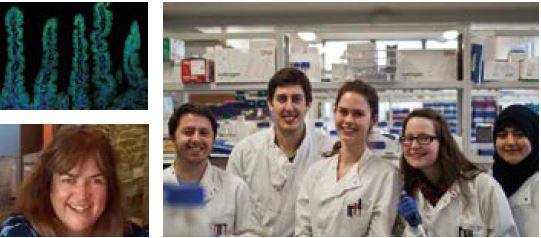Beating bowel cancer
Bowel cancer [also known as colorectal cancer (CRC)] remains the second highest cause of cancer mortality in the UK. Research in Bristol focuses on understanding the early biology of CRC with the aim of identifying novel approaches for both the prevention and treatment of colorectal cancer.
The team in Bristol have focused on cancer prevention for a number of years contributing to institutions such as the National Health Service (NHS), the National Institutes of Health (USA) and the Mayo Clinic (USA) encouraging people to eat a high fibre diet to reduce the risk of bowel cancer. The University of Bristol’s Colorectal Tumour Biology (CTB) group, led by Professor Ann Williams, continues to participate in international clinical prevention trials
assessing the use of aspirin in people at increased risk of developing bowel cancer (CAPP3).
Currently the CTB group is focused on two areas of research: in collaboration with Mr Adam Chambers they are investigating the role of BCL-3/NF-kB signalling on stem cell plasticity and therapeutic resistance; in collaboration with Dr Emma Vincent they are studying the effect of non-steroidal anti-inflammatory drugs (NSAIDs) including aspirin and 5-ASA on cancer metabolism, identifying novel metabolic vulnerabilities that can be exploited both for the prevention and treatment of CRC.
The CTB group’s research uses unique human colorectal model systems to derive new insights that are then validated in patient-based clinical trials through partnership with the University Hospitals Bristol and Weston NHS Foundation Trust. By combining cell and molecular biology, population health research and clinical studies, we aim to deliver an integrated programme of research to improve both the prevention and treatment of colorectal cancer.
http://www.bristol.ac.uk/cellmolmed/research/cancer/cruk-ctb.html
Publications:
- Holt AK et al. (preprint). Aspirin reprogrammes colorectal cancer cell metabolism and sensitises to glutaminase inhibition. bioRxiv.
- Nounu A et al. (2021). A combined proteomics and Mendelian randomization approach to investigate the effects of aspirin targeted proteins on colorectal cancer. Cancer Epidemiology, Biomarkers and Prevention.
- Dixon SW et al. (2021). 5-aminosalicylic acid inhibits stem cell function in human adenoma derived cells: implications for chemoprophylaxis in colorectal tumorigenesis. British Journal of Cancer.

Top Left: Beta-catenin expression (green) in intestinal epithelial cells (the nuclei of the individual cells are shown in blue). Beta-catenin signalling is critical for maintenance of the normal tissue; deregulation of this pathway represents the earliest stage of tumour development. Bottom left: Prof Ann Williams. Right: Members of the Colorectal Tumour Biology group.